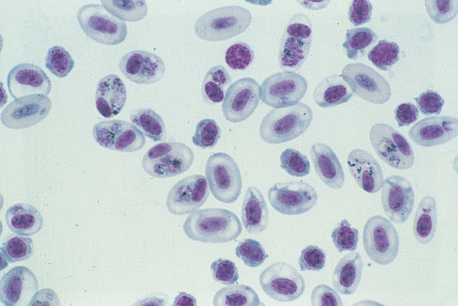Difference between revisions of "Avian Medicine Q&A 23"
| (One intermediate revision by the same user not shown) | |||
| Line 3: | Line 3: | ||
|- | |- | ||
| align="center" | [[File:Manson_logo.gif|90px|Mansonlogo]] | | align="center" | [[File:Manson_logo.gif|90px|Mansonlogo]] | ||
| − | | align="left" | This question was provided by [[:Category:Manson|Manson Publishing]] as part of the [[OVAL Project]]. See more [[ | + | | align="left" | This question was provided by [[:Category:Manson|Manson Publishing]] as part of the [[OVAL Project]]. See more [[Category: Avian Medicine Q&A|Avian Medicine questions]] |
|} | |} | ||
<br><br><br> | <br><br><br> | ||
| Line 17: | Line 17: | ||
These inclusions are compatible with ''Plasmodium sp''. gametocytes. Some strains of plasmodium are highly pathogenic resulting in a severe haemolytic anaemia (avian malaria). | These inclusions are compatible with ''Plasmodium sp''. gametocytes. Some strains of plasmodium are highly pathogenic resulting in a severe haemolytic anaemia (avian malaria). | ||
| − | |l1=Malaria - Birds | + | |l1=Malaria - Birds |
|q2= How is this condition treated? | |q2= How is this condition treated? | ||
|a2= Chloroquine phosphate immediately and at 6, 18 and 24 hours – and primaquine phosphate daily for 3 days – are used in combination to treat avian malaria. | |a2= Chloroquine phosphate immediately and at 6, 18 and 24 hours – and primaquine phosphate daily for 3 days – are used in combination to treat avian malaria. | ||
Revision as of 16:52, 11 July 2011
| This question was provided by Manson Publishing as part of the OVAL Project. See more |
An adult skua (Catharacta skua) was placed in an outdoor aviary after being housed in an indoor aviary for several years. The bird was presented with severe weakness and lethargy. The PCV was 18% (normal 35–55%).
| Question | Answer | Article | |
| Based upon the blood film, what is the most likely cause of the anaemia? | The blood film demonstrates a marked number of immature erythrocytes suggestive of a marked regenerative response.
Many of the erythrocytes contain intracytoplasmic inclusions that contain iron pigment and dramatically alter the position of the host cell nucleus. These inclusions are compatible with Plasmodium sp. gametocytes. Some strains of plasmodium are highly pathogenic resulting in a severe haemolytic anaemia (avian malaria). |
Link to Article | |
| How is this condition treated? | Chloroquine phosphate immediately and at 6, 18 and 24 hours – and primaquine phosphate daily for 3 days – are used in combination to treat avian malaria.
Treatment with these and other anti-malarial drugs are often unrewarding and reinfections are common. Therefore, prevention by controlling the contact between birds and mosquito vectors is the best approach. |
Link to Article | |
